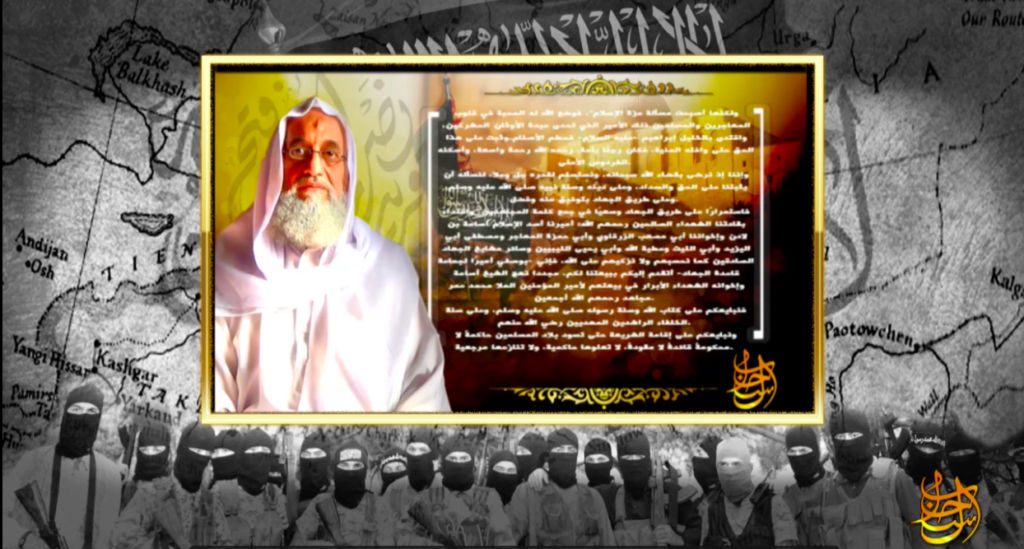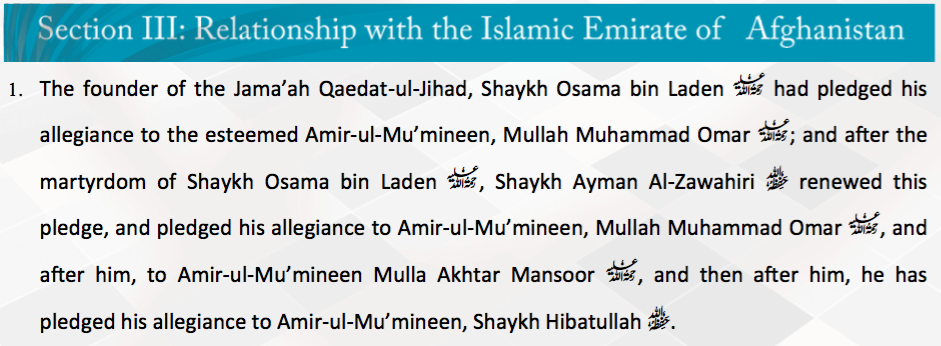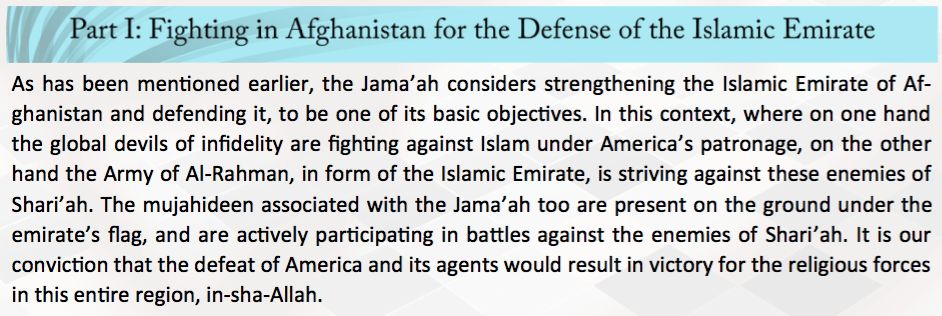
Ayman al Zawahiri has sworn allegiance to the Taliban’s emir multiple times.
Al Qaeda in the Indian Subcontinent (AQIS) has released a 20-page “code of conduct” emphasizing its allegiance to Ayman al Zawahiri and the emir of the Taliban. AQIS says its members are currently fighting “shoulder-to-shoulder with the mujahideen” of the Taliban and calls on Muslims throughout the subcontinent to join or support the “Islamic Emirate of Afghanistan.”
The al Qaeda branch was established in Sept. 2014, bringing together jihadis who were already allied with Zawahiri’s organization. The new code of conduct explains that these same AQIS constituent groups “had been engaged in jihad in this region under the umbrella of Al Qaeda for a long period.” In addition to Afghanistan, AQIS operates in Bangladesh, Burma, India and Pakistan. It has been led by Asim Umar since its inception.

The document provides a cursory look at the bureaucratic structure of AQIS, which is referred to as the “jama’ah” (or organization) and headed by an amir (Asim Umar) and vice amir. Certain “administrative matters” can be changed “as needed” by the amir in “consultation with” the shura council, which acts as a board of advisors. A sharia committee comprised of jihadi scholars is “responsible for providing guidance in matters related to Islamic law.” In addition, the document mentions a “military committee,” which is consulted on various matters, including the treatment of prisoners. (The Al Qaeda parent organization has had a similar structure.)
Oath of allegiance to Zawahiri, Taliban leader
AQIS “operates in obedience of the Amir of Al Qaeda (Central),” meaning Zawahiri. Since its “beginning” in 2014, the code of conduct reads, AQIS “has been engaged in jihad in line with the general guidelines of Al Qaeda” — a reference to the rules drawn up and disseminated by Zawahiri in 2013. These same guidelines “served as a basic resource during the preparation” of its new code of conduct, AQIS writes.
While AQIS and its amir are openly loyal to Zawahiri, the al Qaeda master owes his own fealty to the Taliban’s most senior leader, who has been deemed the “Amir of the Faithful,” a title usually reserved for the Muslim caliph. Ultimately, therefore, AQIS’s allegiance passes through Zawahiri to the Islamic Emirate of Afghanistan as well.

The “code of conduct” outlines the history of al Qaeda’s fealty to the Taliban, reminding readers that Osama bin Laden first pledged bay’ah (an oath of allegiance) to Taliban founder Mullah Omar. A screen shot of this summary, in English, can be seen above.
After bin Laden’s death in 2011, the document’s authors note, Zawahiri “renewed this pledge” to Omar. AQIS ignores the inconvenient fact that Zawahiri and al Qaeda marketed their fealty to Omar well after the Taliban’s first leader had passed away in 2013.
After the Taliban finally admitted in mid-2015 that Omar had died two years prior, Zawahiri “pledged his allegiance” to Omar’s successor, Mullah Mansour. But Mansour himself was killed in May 2016. So Zawahiri then repeated the same oath to the Taliban’s current emir, Mullah Haibatullah Akhundzada.
“Fighting in Afghanistan for the Defense of the Islamic Emirate”

“One of the major objectives of the Jama’ah [AQIS] is strengthening the Islamic Emirate of Afghanistan, defending it, and bringing stability to it,” the text reads. “In pursuit of this objective, the Jama’ah engages the enemies of the Islamic Emirate outside Afghanistan, and also takes part in the battles inside it — fighting shoulder-to-shoulder with the mujahideen of the emirate.”
“Moreover,” AQIS “invites the Muslims of the subcontinent to pledge their allegiance to the Islamic Emirate and to support it.”
The new code of conduct explains that AQIS’s men are integrated into the Taliban’s chain-of-command. “The mujahideen associated with the Jama’ah [AQIS]…are present on the ground under the emirate’s flag, and are actively participating in battles against the enemies of sharia,” the text reads.
This helps to explain why AQIS has produced only minimal propaganda from the battlefields in Afghanistan, even though it is clearly contributing to the fight. In October 2015, for example, the US military announced that it had discovered what is likely the largest al Qaeda training camp in Afghanistan’s history. The camp was operated by AQIS with the blessing of the Taliban in the southern Shorabak district of Kandahar province. Shorabak was subsequently overrun by the Taliban earlier this year.
In Dec. 2016, the US military explained that 250 al Qaeda operatives and leaders had been killed or captured in Afghanistan since the beginning of the year. This was two and half times the American government’s long-held, high-end estimate for al Qaeda’s entire presence in the country.
AQIS believes that an American withdrawal from Afghanistan, signifying Western defeat, would be a boon for the jihadis’ cause throughout the Indian subcontinent. “It is our conviction that the defeat of America and its agents would result in victory for the religious forces in this entire region,” the code reads. While the war in Afghanistan is America’s longest, and there are many reasons to be skeptical about the future of the country, the enemy’s assessment must be weighed when assessing military options going forward. And AQIS thinks that an American defeat would be a clear victory for the jihadists, with effects that ripple throughout the neighboring countries.
Al Qaeda’s choice of targets is often poorly understood, with some thinking that the group is myopically focused on plotting against the West, avoiding so-called “local” conflicts. This is incorrect for many reasons. And AQIS’s code of conduct shows that al Qaeda’s operations throughout the subcontinent have a broader strategy behind them.
AQIS does say Americans are a priority target in Pakistan. America is “the ringleader of the global system of infidelity” and “the central enemy standing against Islamic and jihadi awakening.”
But the group quickly lists various other prospective targets who prop up the “oppressive British system,” which supposedly stands in the way of creating a puritanical Islamic state. People employed by other “non-Muslim” countries inside Pakistan will be attacked.
Various arms of the Pakistani government are discussed as targets as well. “In the face of the secret machinations and plotting of Pakistani intelligence agencies and the open war being waged by the military, the people of faith have no course left other than fighting,” the code reads.
Of course, it is widely suspected that parts of the Pakistani military and intelligence establishment, which supports the Taliban, is complicit in al Qaeda’s activities. While that is likely true, others within the government and armed forces are also fighting al Qaeda and some of its closest allies. Pakistan’s wheels within wheels environment means that some are opposed to al Qaeda, while others are aligned with it.
AQIS unambiguously calls for attacks on the Pakistani military, prioritizing officers over mere soldiers, as well as anyone else in the military-intelligence establishment who stands in the way of implementing sharia. “All personnel of the military are our targets, whether they be in warzones or in the barracks at their bases,” or even on vacation, AQIS writes.
Similarly, military targets throughout India, Bangladesh and Burma are all deemed appropriate.
Attempt to rein in jihadi violence
Zawahiri’s 2013 guidelines were an attempt by al Qaeda to lay down rules for waging jihad around the globe. These rules were grounded in a concern over how ordinary people react to seemingly random acts of terror and violence. Master insurgents learned long ago that in order to achieve their objectives they must win the support of a critical mass of the population. And AQIS’s code of conduct, which builds on Zawahiri’s guidelines, is peppered with observations and arguments from this perspective.
The group lists one of its key objectives as: “Inviting the masses to jihad after acquainting them of our objectives and our operating procedures.” The “Muslim masses are our brethren” and “our relationship with the Muslim masses will be of love and brotherhood,” AQIS writes. In addition to protecting the “lives, wealth, honor, and dignity” of Muslims, AQIS says it has taken on the “responsibility” of “defend[ing] the Muslims of the subcontinent from governmental and non-governmental oppression.”
Generally speaking, AQIS says it wants to “avoid fighting and offending all such people who do not take up arms against us,” while focusing “attention towards the enemies of sharia and the defenders of the system of infidelity.”
“We avoid all such military operations that are beyond the understanding of common Muslims or repulse them away from the mujahideen,” the code reads.
AQIS “forbids hitting or killing targets permissible in sharia when hitting or killing such targets does more harm than good to the jihadi movement.” In other words, even if al Qaeda thinks it is religiously permissible to carry out some attacks, the cost in terms of lost goodwill for the jihadi cause may not be worth it. These tactical prohibitions extend to the “taking” of “the wealth of an infidel,” which is permissible according to sharia law, but may not be prudent if this same “infidel” is “poor,” or from “an oppressed social class.” In such cases, “taking his wealth could result in distorting the image of jihad.”
AQIS builds on Zawahiri’s prohibition against hitting areas frequented by Muslim civilians. “We consider it absolutely wrong to cause blasts in public gatherings, including masjids, funerals, markets, and courtrooms, where there is a possibility of hurting common Muslims,” the group writes. “We consider it a must to avoid even hitting permissible targets in such places, because such operations may hurt the Muslims masses, and thus make one deserving of Allah’s punishment.” Such attacks could also “distort” the “mujahideen’s call” and “strengthen the system of infidelity instead of benefitting Islam.”
The al Qaeda branch argues it is “wrong to kill the wives and children” of “military personnel” in Pakistan and Bangladesh, even though the militaries in both countries are “strengthening the system of infidelity and fighting against the implementation of” sharia. This means that AQIS is opposed, at least in public, to some of the more heinous jihadi attacks inside Pakistan.
Avoiding “peripheral battles,” while focusing on the “oppressive system of infidelity and its defenders”
Much of AQIS’s code of conduct deals with which parties should be targeted. Unlike the Islamic State, which advocates and directs violence against some communities purely as part of its bloodsport, AQIS argues that it has adopted a more targeted approach.
AQIS’s “policy is that other than the war against the oppressive system of infidelity and its defenders, it does not get itself entangled in peripheral battles.”
This “system” is the aforementioned “British” order. Al Qaeda argues that various parties inside Pakistan and from the West seek to maintain this “system.” It supposedly stands in the way of AQIS achieving its goal — a state based on its radical version of sharia law.
With this worldview in mind, AQIS wants its jihadists to avoid operations that are deemed unnecessary or counterproductive. For instance, AQIS argues that Muslim minorities — Shiites, Ahmadis, and Ismailis (referred to as “Rafidees, Qadyanies, and Ismailies” in the text) — are unbelievers and “their deviance” is “clear.” Yet, if they “do not wage an actual war against the people of” the Sunni majority, then AQIS will “not get entangled in a war against them.” Even if such a fight becomes necessary, then AQIS will focus on the leadership of the minority groups involved in the battle.
Similarly, AQIS says it does not indiscriminately target Buddhists, Christians and Hindus. Only if specific Christians commit blasphemy against Islam will AQIS “protect the Muslims from the harm of Christians” by waging war against them. AQIS “does not target churches and cathedrals of the Christians” — this, again, stands in direct contrast to the Islamic State’s tactics. (It should be noted that jihadis have assassinated civilians from these religions in Bangladesh and elsewhere. AQIS’s stated policy is in conflict with this practice.)
AQIS’s bylaws with respect to Buddhists, Christians, Hindus, and Muslim minorities is not altruistic. Instead, it is based on practical, warfighting concerns. Should it successfully build a Taliban-style state in the future, then its supremacist ideology would have room to flourish. “Until the system of infidelity is defeated, we would act on the abovementioned policy,” the text reads. “However, after the conquest, whatever the ‘ulamaa [religious scholars] of the Ummah decide, in-sha-Allah, that would be implemented.”
“Secular groups,” which seek to prohibit the implementation of sharia, are afforded the same leeway in AQIS’s policies. AQIS says it gives “a higher priority to battling those secular groups that are fighting the mujahideen” or “aiding” those who are, but in those cases the organizations’ “leadership” will be a “first priority.”
Even those Muslims who directly participate in democracy will not be labeled as unbelievers, AQIS says. The “religious parties participating in democracy” rely on “irrational and unacceptable interpretations for their partaking in democracy.” Still, AQIS will do its “best in calling them to stop their haram [forbidden] activities.”
Cooperation with other jihadi groups
Another point of divergence from the Islamic State can be found in AQIS’s attitude toward other jihadi groups. Baghdadi’s self-declared caliphate says that groups refusing to join it are apostates. AQIS takes a more inclusive approach, at least in its public rhetoric. AQIS wants other jihadists to adhere to its code of conduct even if they are not formally affiliated with the al Qaeda arm. When others violate the code’s terms, AQIS claims it will take steps to correct their ways. And Asim Umar’s organization invites “the groups fighting in the subcontinent to pledge their allegiance to the Islamic Emirate of Afghanistan, because a useful and constructive alliance in the region is only possible” through allegiance to the Taliban.
Still, some points of contention shine through in the text. For instance, AQIS says it “will work with jihadi groups,” which are “independent from intelligence agencies’ influence,” in India, Bangladesh and Burma. Notably absent from this list of countries is Pakistan, where many of jihadi organizations, including the Taliban, have been allied with the military-intelligence establishment. Indeed, Pakistan’s proxy groups have often been al Qaeda’s allies.
“We call on all jihadi groups working under anti-sharia intelligence agencies in any place to end their dependence on them,” AQIS writes. “This is the only way to help the oppressed Muslims, and to make real progress towards implementation of sharia,” because the militaries of corrupt governments “destroy [the] fruits of these mujahideen’s jihad.”
“The Kashmiri Jihad is a clear example of this,” AQIS warns. It is a telling comment, as the Pakistani state has sponsored the leading jihadi groups fighting Indian forces in Kashmir for years. Even though these same outfits share much in common with al Qaeda and the Taliban, al Qaeda doesn’t think they go far enough. In fact, a senior Kashmiri jihadist, Zakir Musa, has recently aligned himself with al Qaeda, rejecting the allegedly nationalist ways of his ideological cousins in the region.
The end result is that while Pakistan’s sponsorship of jihadism has benefited al Qaeda, Ayman al Zawahiri’s men seek to further cannibalize the movement for their own purposes. And AQIS, with its “code of conduct,” is trying to further that effort.
“The Reviver of Jihad”
AQIS’s code of conduct ends with quotes from Mullah Omar, who called on Muslims to inspect the Taliban’s ways for themselves, and Osama bin Laden. The al Qaeda founder is described as the “Reviver of Jihad,” an honorific title that means bin Laden is credited with awakening Muslims to the necessity of waging jihad.
Bin Laden called for the resurrection of an Islamic caliphate, and he thought the creation of the Islamic Emirate of Afghanistan was a key step toward this goal. Of course, al Qaeda’s 9/11 hijackings invited an American response, which led to the toppling of the Taliban in late 2001 — a blow for the jihadis’ caliphate-building project.
“Today by the grace of Allah, we are going to revive the map of the Islamic World (1400 years old, encompassing three continents) so that by the permission of Allah, the complete Islamic world would turn into a single state under the banner of [the] Caliphate,” the quote from bin Laden at the end of AQIS’s code of conduct reads.
AQIS clearly hopes that the Taliban will be able to revive its state inside Afghanistan. The Islamic Emirate of Afghanistan is closer to that goal today than at any point since Sept. 11, 2001. And it is a goal that AQIS is working towards.








7 Comments
In light of the Code of Conduct remarks, it’s worth pointing out that the Taliban itself, being a “network of religious networks”, contains various factional countercurrents due to some degree of decentralization. From a 2012 CIWAG study (full citation below):
“The predominant or “mainstream Taliban” view is represented by the leadership’s official position; at present, it argues for the expulsion of Westerners from Afghanistan and also insists that the fighters respect rules of engagement and of conduct determined by the leadership itself.
“Another viewpoint is more radical. It is hostile to leadership’s effort to impose rules of engagement, more inclined to utilize indiscriminate terror tactics, and more inclined to cooperate with foreign jihadist elements. Once led by Mullah Dadullah, who was killed in 2007, it has been in disarray since his death but was considered to be in the ascendency in 2010-11, despite the absence of a clear leader.
“A third, small, faction displays pro-Iranian inclinations.
“There is also a more moderate tendency, not yet organized as a faction, favorable to negotiations, whose size is difficult to gauge but seems significant; some leaders at the national and local level allegedly belong to this tendency, including Mullah Baradar.”
From: Giustozzi, Antonio. 2012. Taliban networks in Afghanistan. CIWAG case study series 2011-2012, ed. Marc Genest and Andrea Dew. Newport, RI: US Naval War College, Center on Irregular Warfare and Armed Groups
Interestingly their propaganda doesn’t even mention the Islamic State, who also have killed members of the Taliban, who Al Qaeda effectively pledges to it’s leader.
How is Zawahiri still alive? I mean we have a long list of their leaders that we terminated. Why is he not the #1 target, is he just really lucky? Of course , if Pakistan is protecting him they’re doing a good job so far. There would be a new #1 shortly after we eliminated him but at we wouldn’t have to listen to him anymore.
“It supposedly stands in the way of AQIS achieving its goal — a state based on its radical version of sharia law”.
What we learned as a Muslim is: mainstream Sunni Sharia law could be radical to some people but it has only one version.
Moderate Muslims don’t support shariah law so it does not have a ‘moderate version’.
Old Zawahiri and old AQ that Dan Byman says are over the hill and hakuna matata…
“The new code of conduct explains that AQIS’s men are integrated into the Taliban’s chain-of-command.” ISI probably wrote the stupid code. The ISI run the Taliban, so this is a win-win for ISI. They don’t get the negative attention from CIA that working directly with Al Qaeda would bring and they get to run TB ops in AFG w AQ hitters.
“AQIS says it does not indiscriminately target Buddhists, Christians and Hindus…” More lies!! AQIS sure does specifically target non-Muslims. They iced everyone in Holi Bakery who could not recite the Koran.
Q. What do you get when you cross a terrorist with a spy? A. ISI
PS The last sentence suggests that LWJ views TB controlled areas as quasi-AQ areas as well.
Maybe we should just start stating that “the enemy” controls 90% of place X rather than splitting jihadi hairs. They all pray towards Mecca and sleep w children.
You know what I always say: Kill them all and let Allah sort them out.
Who cares what this rat Ayman Al Zawahiri does or says?